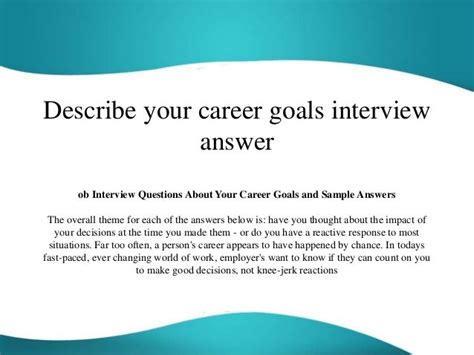Career Goals Unveiled: Answering An Interview Essential

Interviews are an essential part of the job search process. They provide employers with the opportunity to get to know candidates beyond their resumes and allow candidates to showcase their skills and experience. One common question that often comes up during interviews is about career goals. Answering this question can be tricky, but with proper preparation, you can provide a thoughtful and impressive response.
Why is Answering the Career Goals Question Important?
The career goals question is important because it allows employers to understand your motivation and ambition. Your response can also help them evaluate whether you are a good fit for the company and the position. Additionally, answering this question can help you demonstrate your long-term vision and how you plan to contribute to the company’s growth and success.
How to Prepare for the Career Goals Question
1. Research the Company
Before your interview, research the company and its culture. Look for information about its mission, values, and goals. This can help you tailor your response to align with the company’s vision and show that you are a good fit for the organization.
2. Reflect on Your Career Goals
Reflect on your career goals and aspirations. Think about what you hope to achieve in your career and how the position you are interviewing for fits into your long-term plans. Consider how the company’s mission and values align with your goals and how you can contribute to the organization’s success.
3. Practice Your Response
Practice your response to the career goals question. Write down your goals and practice articulating them in a clear and concise way. Make sure your response is relevant to the position and the company and that it highlights your skills and experience.
Tips for Answering the Career Goals Question
1. Be Specific
Be specific about your career goals and how they align with the position and the company. Avoid generic responses that could apply to any job. Instead, provide detailed examples of how you plan to achieve your goals and how the company can help you get there.
2. Show Enthusiasm
Show enthusiasm for the position and the company. Let the interviewer know that you are excited about the opportunity and that you are motivated to contribute to the organization’s success. This can help demonstrate your commitment and passion for the role.
3. Be Realistic
Be realistic about your career goals. Avoid setting unrealistic expectations or goals that are too broad or vague. Instead, focus on goals that are specific, measurable, achievable, relevant, and time-bound (SMART).
4. Highlight Your Skills and Experience
Highlight your skills and experience and how they relate to your career goals. Provide examples of how you have used these skills in the past and how they can help you achieve your goals in the future.
5. Emphasize Your Long-Term Vision
Emphasize your long-term vision and how you plan to contribute to the company’s growth and success. This can help demonstrate your commitment to the organization and your willingness to invest in your career.
6. Avoid Negative Responses
Avoid negative responses when answering the career goals question. Don’t focus on what you don’t want or what you don’t like about your current job. Instead, focus on what you hope to achieve in your career and how the position and the company can help you get there.
Conclusion
Answering the career goals question can be nerve-wracking, but with proper preparation, you can provide a thoughtful and impressive response. Remember to research the company, reflect on your career goals, and practice your response. When answering the question, be specific, show enthusiasm, be realistic, highlight your skills and experience, emphasize your long-term vision, and avoid negative responses. By following these tips, you can demonstrate your motivation, ambition, and commitment to your career.
FAQs
Q: What are some common career goals?
A: Some common career goals include advancing to a higher position, learning new skills, becoming an expert in your field, starting your own business, and making a positive impact on society.
Q: How do I know if my career goals are realistic?
A: Your career goals should be specific, measurable, achievable, relevant, and time-bound (SMART). They should also align with your skills, experience, and interests. If you are unsure if your goals are realistic, consider seeking the advice of a career counselor or mentor.
Q: What if I don’t have any specific career goals?
A: It’s okay if you don’t have any specific career goals. However, it’s important to show that you are motivated and have a general direction for your career. Focus on your skills, experience, and interests and how they can contribute to the company’s success.
